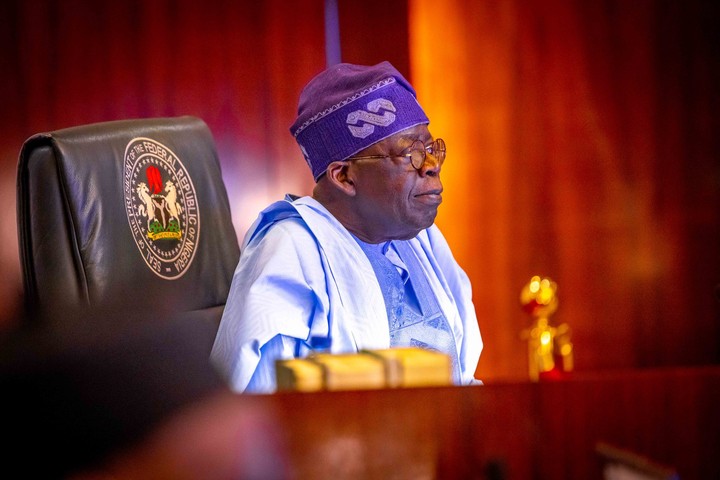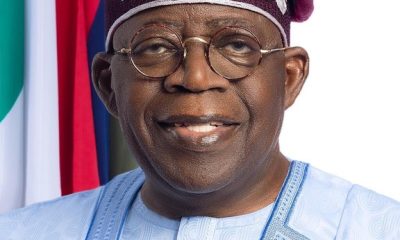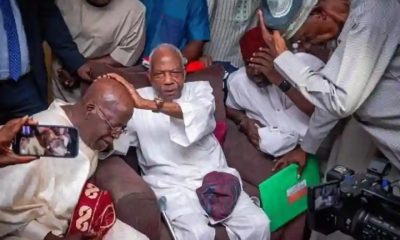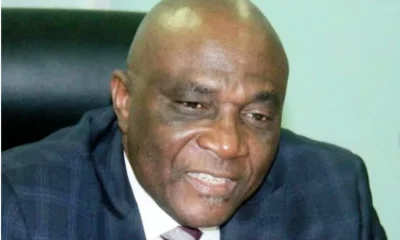News
NBF Sec-Gen. commends Tinubu on stand-alone ministry of sports

The Secretary General of Nigeria Boxing Federation (NBF), Dapo Akinyele, on Friday commended President Bola Tinubu for splitting the ministry of Youths and Sports Development.
Akinyele, in an interview with the News Agency of Nigeria (NAN), said this would enable John Enoh, newly appointed sports minister, focus on the growth of sports in the country.
“First, we thank the president for appointing a separate minister for Sports, this is a cheering news because it will allow for development we all crave for in sports.
“We also congratulate the new Minister of Sports, John Enoh, for the deserving position of serving the sports ministry.
“I believe that things will begin to run smoothly as the minister gets his hands full on the many tasks of handling the sports ministry.
“Now that we are going for the Olympics in Paris in less than a year, the sports minister will have his hands full of activities,” he said.
Akinyele pointed out that the sports budget before the ministry was split into two had been meagre because the funds had to be shared by two ministries.
“Before now, various sports have been starved of funds because we have to share funds with the Youths Affairs, which mostly take the lion share of the ministry’s budget.
“Sports under this new arrangement as an independent ministry will have the opportunity to present its own budget and defend it. We will now know what comes in to sports development and what goes out
“The minister of sports can now concentrate on sports development alone because there are may things to be done,” he said.
Akinyele cited the example of the NBF, which he noted needed more funds for it’s various grassroots developmental programmes.
“Boxing is one of the highlights in Nigerian sports circle in the past years, as we have once dominated the scene in boxing both locally and internationally.
“Nigeria has produced boxers of repute in the good old days, but we have seen our fortunes nosediv because of many factors, which include inadequate funding.
“The Boxing Federation has been receiving meagre funding, while the situation has greatly hampered our grassroots developmental programmes.
“Nigeria is not lacking when it comes to talents because we can find as many boxers as possible around, but we lack sports infrastructure to develop them,” he said.
Akinyele also called on private organisations to return to sponsorship of sports which was the order of the day before the lull.
“The private organisations should also come to the aid of the boxing federation because this has not been the situation in the past.
“Many years ago, boxing had received immense support and sponsorships from corporate organisations such as National Oil, Mobil Oil, Shell Oil Development and also some of the serving and retired generals.
“So, if we want boxing to return to its former glory, then, all hands must be on deck, we need more sports infrastructure to train our boxers
“We need equipment such as boxing ring, gloves, punching bags, a good gymn and others. We also want the state association to encourage more sports infrastructural development in their state as well,” he said.
News
Woman killed while crossing road in Anambra

The Federal Road Safety Corps (FRSC), Anambra State Sector Command, has confirmed the death of a woman in an accident at Okpoko Market on the Asaba-Onitsha Road.
The Sector Commander, Mr Adeoye Irelewuyi, who confirmed the accident to journalists in Awka on Thursday, said that the woman was hit while she was crossing the road.
He said that the accident, which occurred on Wednesday, involved a commercial tow truck with registration number XA550BMA.
“Eyewitness report reaching us indicates that the truck was towing a vehicle in an uncontrollable speed along the axis.
“The vehicle that was being towed got detached from the tow truck.
“It hit and killed a female adult, who was said to be crossing the road, while the tow truck continued its movement.
“FRSC rescue team came to the scene and took the woman to Toronto Hospital, Onitsha, where she was confirmed dead and her body deposited at the hospital’s mortuary,” he said.
While sympathising with the family of the dead, the sector commander urged motorists, especially tow truck drivers, to exercise a high level of professionalism.
He also urged the drivers to always use standard equipment and avoid speeding.
News
LASG’s maize palliative impactful, says poultry association chair

The Chairman, Poultry Association of Nigeria (PAN), Lagos State Chapter, Mr Mojeed Iyiola, said the state government’s maize palliative to members of the association made a positive impact on the sector.
Iyiola said this in an interview with the News Agency of Nigeria (NAN) on Thursday in Lagos.
“We received about 150,000 tons of maize in February from the Lagos State government as palliative to cushion the effect of high feed prices.
“The major benefit of the palliative is that it actually cushioned the cost of production for most poultry farmers in the state.
“The palliative was beneficial as it made the cost of some poultry produce, especially eggs to drop,” Iyiola said.
He noted that prior to the palliative, a crate of egg was sold between N3,500 and N3,700 at the farm gate, but after the palliative, it now sells between N3,200 and N3,400.
According to the PAN chair, retailers and middlemen who sell from N3,800 to N4,200 do that for their personal gain.
“We have urged our members to sell their eggs at reasonable prices following the receipt of the palliative from the government.
“We appreciate the Lagos State government for the palliative but we also urge the federal government to do likewise, to further reduce the cost of production in the sector.
“This will consequently lead to drop in the prices of all poultry produce across board,” he said.
He said the palliative was shared among financial members of the association at no extra cost.
“As an association we shared the grains equally across PAN’s eight zones in the state equally. We also mandated each zone not the sell even a grain of the maize.
“We, however, considered new poultry farmers who wanted to the join the association as beneficiaries of the palliative,” said Iyiola.
He noted that through the palliative, more poultry farmers were recruited into the association.
“The maize was shared only to poultry farmers and not feed millers, it is the major component of poultry feed formulation,” he said.






















